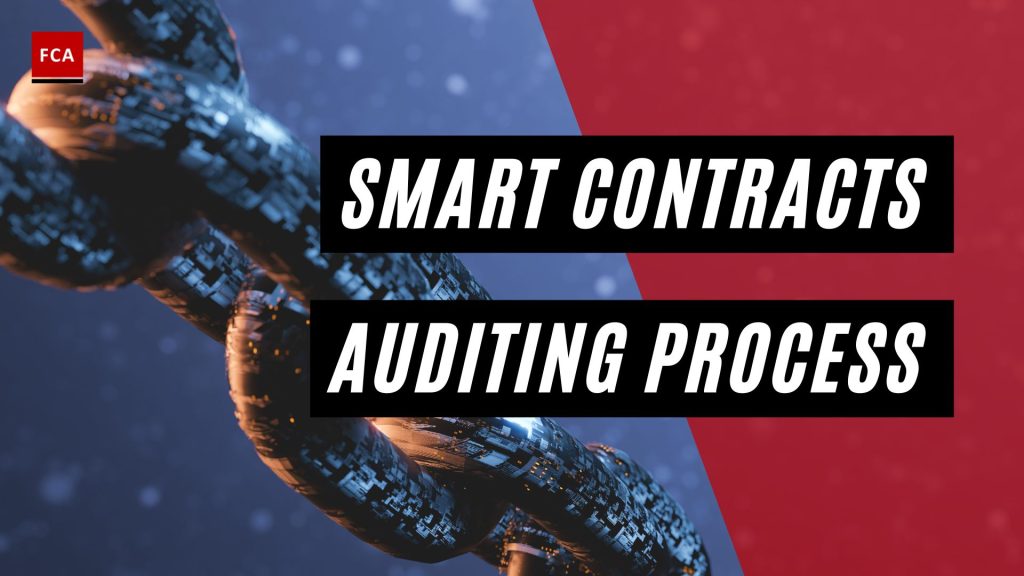Smart contracts auditing process is an essential step in the deployment of blockchain applications, aimed at identifying and rectifying potential coding errors or vulnerabilities, thereby minimizing the risk of security breaches and ensuring the robustness of the contractual terms.
To conduct a proper smart contract audit, the firm should follow certain norms and techniques in a structured manner. Although the structure of the auditing process can vary from company to company, the overall outline remains the same in general. Let us go through each step of a generic smart contract auditing process.

Smart Contracts Auditing Process
Specification Gathering and Client Consultation
A smart contract audit can only occur with a deep understanding of the project’s details. So, the first step of auditing a smart contract involves studying the project by consulting the client and gathering specifications. In this step, an auditor comprehends the framing of the code, its design, architecture, build process, and other vital information to understand the intended behavior of the smart contract.
Automated Review and Testing
In this step, an auditor leverages sophisticated and high-end tools and software, like Quill Hash, Slither, Certik’s SkyHarbor, and more, to review and analyse the contract codes. This step inspects the source code to identify if it has any potential risks like security loopholes, bugs, syntax errors, and exploitable and weak codes.
Manual Analysis and Testing
Errors and code loopholes missed in the automated review and testing are caught in the manual analysis and testing phase. Here, the auditors examine the code line-by-line to find whether the smart contract presents any unanticipated behavior or security vulnerabilities like re-entrance, denial of service, overflows, time manipulation, front running, logical flaws, and malicious libraries.
Functional Testing
In functional testing, each function and method is tested on multiple parameters and conditions for any error and confirm if each contract function performs as outlined in the specifications. In this phase, the auditor verifies and ensures that the smart contract does not deviate from its intended behavior. It also involves checking if the smart contract executes any gas-intensive operations and testing if the operational and business logic are implemented properly.
Initial Audit Report Submission
Once the smart contract is thoroughly inspected for any vulnerability, the team of auditors of the smart contract audit company submits an initial audit report. This audit states all the findings and effective recommendations to fix or rectify the issues.
Rectifying the Codes
After submitting the initial audit report, developers fix the issues and bugs detected based on the suggestions mentioned in the initial report. The codes can be rectified from either the client side or the audit firm, as per the client’s requirement.

Inspecting the Fixed Codes
Once developers fix the codes, the audit firm again reviews the rectified smart contract and runs a series of tests to authenticate if the code quality has improved and all loopholes have been addressed.
Final report Documentation and Submission
This is the final step in a smart contract auditing process. It involves documenting each detail and critical information of the smart contract auditing process to hand over a transparent, fully customized, and comprehensive report to the client. A smart contract audit report details differ from company to company.
However, generally, a smart contract audit report involves the following:
- The goal of the project
- The effort
- Audit approach
- Audit techniques
- Audit tools
- Detected vulnerabilities and their severity
- Summary of the findings
- Recommended remediations
- Vulnerability fixes
- Time duration

Final Thoughts
A robust and thorough smart contract audit is integral to ensure the overall security and functionality of decentralized applications. This meticulous process, generally comprised of specification gathering, automated and manual testing, functional testing, initial audit report submission, code rectification, inspection of the fixed codes, and final report documentation, seeks to identify and mitigate potential vulnerabilities. By coupling high-end tools with the critical eye of experienced auditors, the audit strives to catch any code loopholes, errors, or potential security risks.
Consequently, such a detailed review strengthens the resilience of smart contracts, bolsters user trust, and fortifies the overall health of the blockchain ecosystem. Ultimately, while the smart contract audit process may vary from firm to firm, its goal remains the same – to ensure the integrity and functionality of smart contracts, thereby enhancing the security and reliability of blockchain technology.








